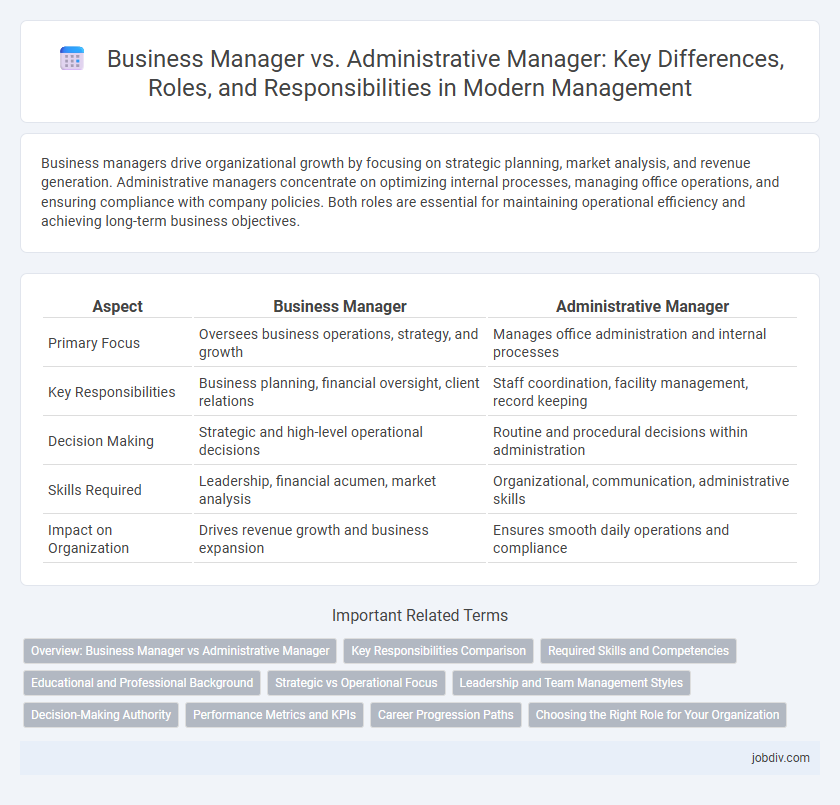Business managers drive organizational growth by focusing on strategic planning, market analysis, and revenue generation. Administrative managers concentrate on optimizing internal processes, managing office operations, and ensuring compliance with company policies. Both roles are essential for maintaining operational efficiency and achieving long-term business objectives.
Table of Comparison
| Aspect | Business Manager | Administrative Manager |
|---|---|---|
| Primary Focus | Oversees business operations, strategy, and growth | Manages office administration and internal processes |
| Key Responsibilities | Business planning, financial oversight, client relations | Staff coordination, facility management, record keeping |
| Decision Making | Strategic and high-level operational decisions | Routine and procedural decisions within administration |
| Skills Required | Leadership, financial acumen, market analysis | Organizational, communication, administrative skills |
| Impact on Organization | Drives revenue growth and business expansion | Ensures smooth daily operations and compliance |
Overview: Business Manager vs Administrative Manager
A Business Manager oversees strategic planning, financial performance, and overall company growth, focusing on market analysis, sales targets, and profit maximization. An Administrative Manager concentrates on organizational efficiency, managing office operations, staff coordination, and resource allocation to ensure smooth daily workflows. Both roles are crucial for business success but prioritize different operational aspects to drive productivity and achieve company objectives.
Key Responsibilities Comparison
Business Managers oversee strategic planning, financial performance, and market expansion to drive company growth, while Administrative Managers focus on organizing office operations, managing support staff, and ensuring efficient workflow systems. Business Managers prioritize revenue generation and business development initiatives, whereas Administrative Managers emphasize internal processes, resource allocation, and compliance with organizational policies. Both roles require leadership skills, but their core responsibilities differentiate in scope and alignment with company objectives.
Required Skills and Competencies
Business Managers require strong strategic planning, financial analysis, and market insight skills to drive company growth and competitive advantage. Administrative Managers need expertise in organizational coordination, process optimization, and effective communication to ensure seamless daily operations. Both roles demand leadership, problem-solving abilities, and proficiency in project management software for successful team and resource management.
Educational and Professional Background
Business Managers typically possess degrees in Business Administration, Management, or Finance, emphasizing skills in strategic planning, marketing, and financial analysis. Administrative Managers often hold qualifications in Public Administration, Human Resources, or Office Management, focusing on organizational operations, policy implementation, and employee supervision. Professional certifications like PMP for Business Managers or CAP for Administrative Managers further enhance their expertise and career prospects.
Strategic vs Operational Focus
Business Managers prioritize strategic focus by setting long-term goals, analyzing market trends, and driving organizational growth. Administrative Managers emphasize operational focus, ensuring efficient daily office functions, resource allocation, and compliance with policies. Strategic planning led by Business Managers complements the Operational management overseen by Administrative Managers.
Leadership and Team Management Styles
Business Managers emphasize strategic leadership, driving innovation and growth by setting clear goals and motivating teams through visionary direction. Administrative Managers focus on operational leadership, ensuring efficiency and consistency by maintaining structured processes and managing day-to-day team coordination. Both roles require adaptive team management styles, with Business Managers fostering creativity and Administrative Managers prioritizing order and compliance.
Decision-Making Authority
Business Managers hold extensive decision-making authority, overseeing strategic planning, budgeting, and operational execution to drive company growth and profitability. Administrative Managers focus predominantly on implementing company policies, managing daily office functions, and ensuring compliance with organizational standards. The scope of decision-making for Business Managers is broader and more strategic compared to the more procedural and supportive decision-making of Administrative Managers.
Performance Metrics and KPIs
Business Managers concentrate on strategic performance metrics such as market share growth, revenue targets, and customer acquisition rates to drive business expansion. Administrative Managers focus on operational KPIs including employee productivity, process efficiency, and compliance adherence to ensure smooth organizational functionality. Both roles utilize tailored performance indicators to optimize their specific management objectives and contribute to overall company success.
Career Progression Paths
Business Managers typically advance into roles such as Operations Director or Chief Executive Officer by honing strategic planning, market analysis, and revenue growth skills. Administrative Managers often transition to positions like Office Director or Facilities Manager, emphasizing organizational efficiency, resource allocation, and staff supervision expertise. Career progression in Business Management leans toward broad leadership and profit-driven responsibilities, while Administrative Management focuses on optimizing support functions and internal processes.
Choosing the Right Role for Your Organization
Business Managers focus on driving growth through strategic planning, market analysis, and revenue optimization, making them ideal for organizations aiming to expand and enhance competitiveness. Administrative Managers specialize in streamlining internal operations, overseeing office functions, and ensuring compliance, which benefits companies seeking efficiency and smooth organizational processes. Selecting the right role depends on your organization's priorities: prioritizing external growth favors a Business Manager, while emphasizing internal system management calls for an Administrative Manager.
Business Manager vs Administrative Manager Infographic

 jobdiv.com
jobdiv.com